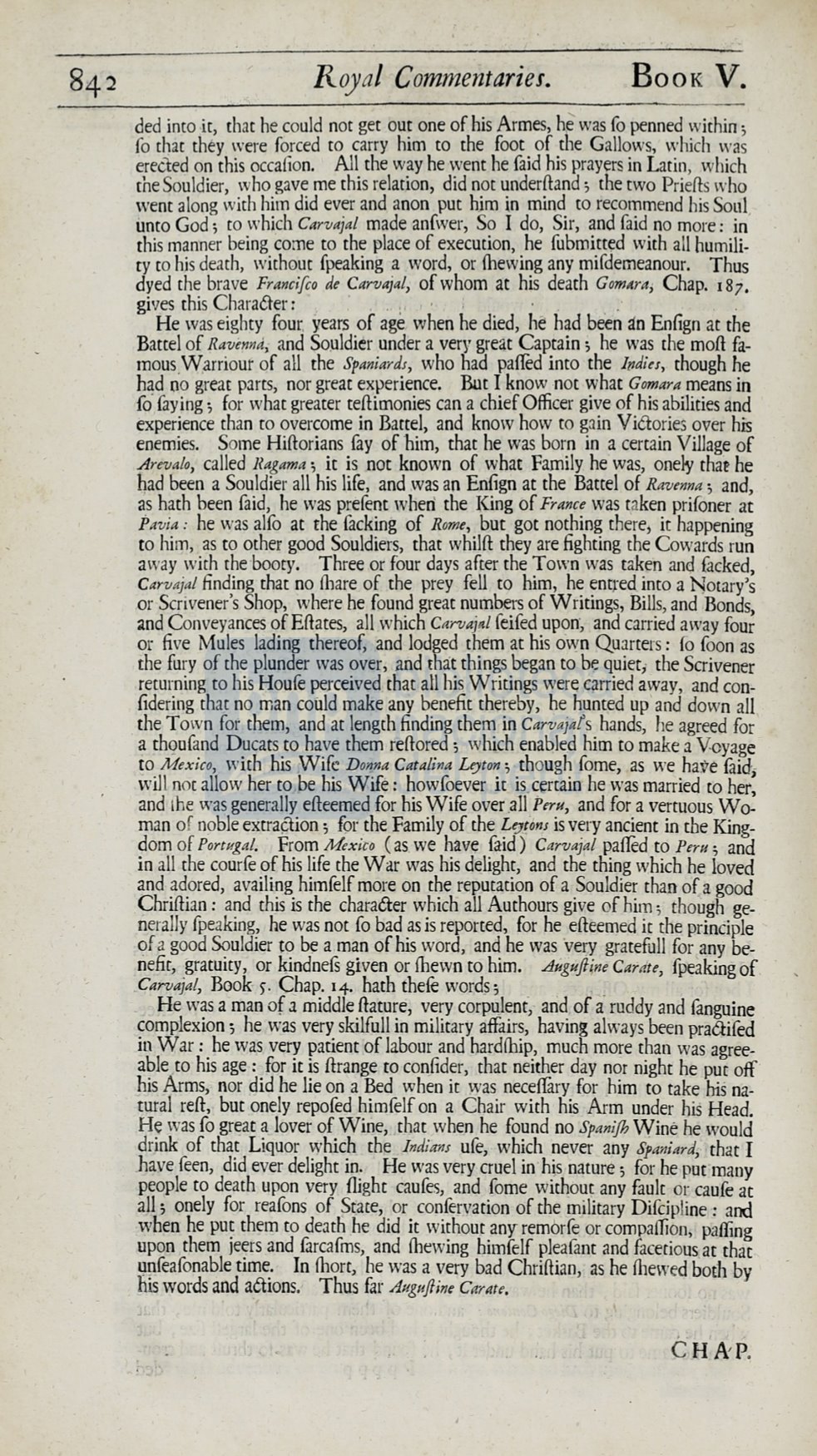

Royal Commentari_es.
Boo~ V.
ded inco :it, thac he could noc gec out one of.his Armes, hi was fo penned wichin;
fo
chac théy were forced
to
carry him
to
che foot of che Gallows, which was
erecied on chis occafion. Ali che way he went he faid his prayers
in
Latin, which
che Souldier, who gave me chis relation, did noc underíl:and; che two Prieíl:s who
wenc along wich him did ever and anon puc him in mind
to
recomrnend his Soul,
unto God ;
to
which
Carvajal
made anfwer, So I do, Sir, and faid no more: in
this manner being come to che place of execucion, he fubmitted with ali hurnili–
ty
to
his death, wichouc fpeaking a .word, or íhewing any miídemeanour. Thus
dyed che brave
Francifco de Carvajal,
o[
whom at his death
Gom,ira,
Chap.
187.
gives chis Charalter: , : , . :, , , ;
· .
. .-
. .
He was eighcy four. years of age, when he died, he had been
án
Eníign ac che
Batee! of
Ravénnd;
and So.uldiér under a very greac Captain
~
h~ was che moíl:
fa–
mous_
W
.arriout qf all the
Spaniards,
who had paífed into the
lttdies,
chough he
had no great parts, nor greac experience. Bm I know not what
Gomara
means
in
fo
faying; for whac greacer teíl:imonies can a chief Officer give of his abilities and
experience chao ro overcome in Battel, and know how to g:lin Viétories over his
enemies. Some Hiíl:orians fay of 'him, thac he was born in a cercain Village of
Arevalo,
called
Ragama
;
ir is not known of what Family he was, onely thar he
b.adbeen a Souldier all his life, and .was an Eníign at che Batee! of
Ravenna;
and,
ás hath been faid, he was p¡eíenc wheri che ¡(ing of
France
was taken prifoner at
Pavia :
he was alfo at the facking of
Rome,
bue got nothing chere; ir happening
to
him, as
to
other good Souldiers, chac whilíl: they are fighting cbe Cowards run
away with che·boory. Three or four days after che Town was taken and facked,
Carvajal
finding chac no íhare of che prey frll
to
him, he encred. imo a Notary's
or Scrivener's Shop, where he found greac numbers of Writings, Bills, and Bonds,
and Conveyances of Eíl:ates, al! which
Carvajal
feifed upon-, and carried away four
or five Mules lading thereof, and lodged chem at his o\~n Quarcers :
fo
foon as
the fury of che plunder was over; and that things began to bP. quiet; the Scrivener
recurning to bis Houfe perceived chac atl bis Writings wer~ c~rried away, and con–
Gdering tha_t no man could make any benefit thereby, he hunted up'and down all
the Town foe them, and at lengch finding them in
Carvaja!s
hands, he agreed for
a th9afand Ducats
to
have them reíl:ored; which enaqled him
to
make aVoyage
to
Mexico,
wich his ;Wife
Do1,na Catalina Leyton;
though fome, as we ha:vé faid,
will
noc allow her
to.behis Wife: howfoever ir is.cercain he was·married to her,
and !he was generally eíl:eemed for his Wife over .all
Peru,
and for a vertuous Wo–
man of noble excra~ion ,
fo1'
che Family of che
Le.J!bns
is very ancienc in che King–
dom of
Portugal.
From
Mexico
~
as we have faid)
Carvajal
paífed to
Peru;
and
in ali the courfe of his life che War was his delighc, and che thing which he loved
and adored, availing himfelf more on che repucation of a Souldíer chan of a good
~hriíl:ian: and this is the charaéter whicli ali Auchours give of him; rhough ge–
nerally fpeaking, he was not fo bad as is reponed, for he eíl:eemed
it
che principie
ofa good Souldier
to
b~ a man ofhis word, and he was 've~y gracefull for,any be–
nefü, gracuicy, or kindnefs given or fhewn to him.
..11úguftjne Carfl~e,
fpeaking of
Carvajal,
Book,
5.
C_hap.
14.
hath thefe word_s ; _ .
.
He was a man
of
a middle fiature, very corpuJenc,
and.ofa rudcly and faoguine
complexion; he was very skilfull in milirary affairs, having always been prall:ifed
in War : he was very patienc of labour and bardfbip, much more rhan was agree–
able
.to
bis age : for it is íl:range
to
conJider, that neither day nor nighr be puc off·
bis Arms,-nor qid he líe on a Bed when ir was neceffary for him to cake his na–
tural reíl:, but onely repofed himfelf on a Chair wich his Arm under bis Head.
He was fo gr~at a lover of Wine, char wheJ1 he found no
Spanifh
Winé he would
drink of thac Liquor vyhich che
Jndians
u[e,
which never any
S¡aniard,
chat I
.have feen, did ever delighc in. He was very cruel in·hts naturé; for he puc many
people
to
death 1:1pon very ílight caufes, and fome wicqouc any faulc or caufe ar
all ;
onely for reafons of ~(are, or confervacion of che rnilitary Difcipline : and
when he pu~ rhem to deacfi he did it wi~houc _any rem6rfe or compaílion, paffing
upo¡;¡ them 1eers and farcafms, and fhewmg h1mfelf pleafanc and
facecious.acthac
1g1feafonable time.
In
fhorc, he was a very bad Chrifüan,, as he fhewed both by
his words and aétions. Thus far
Auguftine Carate,














